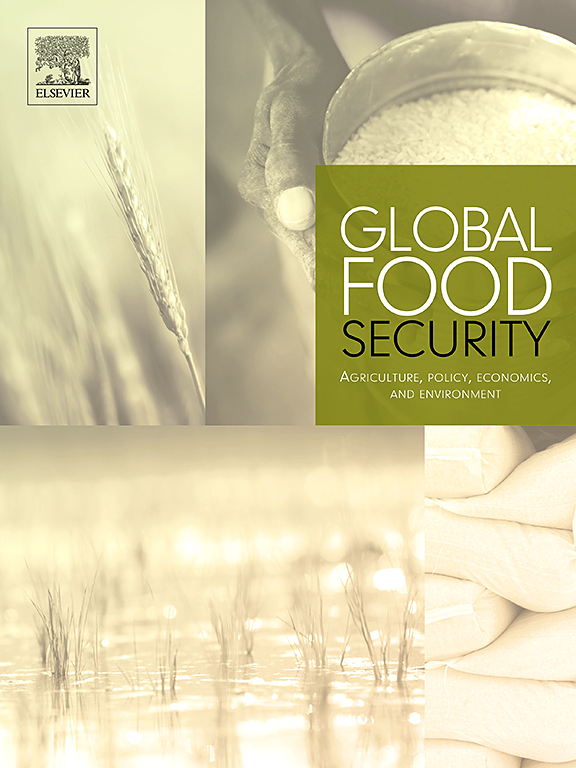The challenge climate change poses to achieving resilient and inclusive rural transformation (RITI)
IF 9.6
1区 经济学
Q1 FOOD SCIENCE & TECHNOLOGY
Global Food Security-Agriculture Policy Economics and Environment
Pub Date : 2024-10-16
DOI:10.1016/j.gfs.2024.100811
引用次数: 0
Abstract
Responding to climate change presents deep challenges to achieving the resilient and inclusive rural transformation needed to eradicate global poverty. Exposure and vulnerability to climate hazards in areas of high rural poverty create an urgent need for adaptation. Poor rural areas and people experience higher limits to adaptation and thus higher costs in achieving effectiveness, as well as greater risk of incurring losses and damages where adaptation is insufficient. Mitigation measures in the agriculture, forestry and land use (AFOLU) sector could impose large, underestimated costs in the form of foregone opportunities for improved livelihoods. Past and current emission levels associated with wealth and opportunity are highly unequally distributed. The constrained additional carbon space to remain under 1.5 or 2 degrees of global warming mandates low emissions development pathways, requiring investments of trillions of dollars per year. Financing currently available is neither sufficient nor provided under the terms required to support a Just Transition. Overcoming these challenges requires building political will through explicit recognition and widespread communication of how climate change response can further disadvantage the poorest people in the global community. It requires revisiting distributional implications of methodologies for prioritizing mitigation options and devising approaches based on equity. Increasing the flow of financing under enabling conditions and integrating development and climate change is an urgent priority. A radical revamping of technical and policy approaches to climate change response and rural development strategies is needed to ensure their mutual reinforcement and prioritization of a resilient, inclusive approach to rural transformation.
气候变化对实现具有复原力和包容性的农村变革(RITI)构成的挑战
应对气候变化对实现消除全球贫困所需的具有复原力和包容性的农村转型提出了严峻挑战。在农村高度贫困地区,气候灾害的暴露和脆弱性造成了对适应气候变化的迫切需求。农村贫困地区和贫困人口在适应气候变化方面受到的限制更多,因此在取得成效方面的成本也更高,而且在适应不足的情况下,遭受损失和损害的风险也更大。农业、林业和土地利用(AFOLU)部门的减缓措施可能会带来巨大的、被低估的成本,即丧失改善生计的机会。过去和当前与财富和机会相关的排放水平分布极不均匀。要保持全球升温不超过 1.5 或 2 度,额外的碳空间受到限制,这就要求走低排放的发展道路,每年需要数万亿美元的投资。目前可用的资金既不充足,也不符合支持 "公正过渡 "所需的条件。要克服这些挑战,就需要通过明确认识和广泛宣传气候变化应对措施会如何使全球社会中最贫穷的人处于更加不利的地位,从而建立政治意愿。这需要重新审视确定减缓方案优先次序的方法对分配的影响,并制定基于公平的方法。当务之急是在有利条件下增加资金流,并将发展与气候变化结合起来。需要从根本上改革应对气候变化和农村发展战略的技术和政策方法,以确保它们相互促进,并优先考虑具有复原力和包容性的农村转型方法。
本文章由计算机程序翻译,如有差异,请以英文原文为准。
求助全文
约1分钟内获得全文
求助全文
来源期刊

Global Food Security-Agriculture Policy Economics and Environment
FOOD SCIENCE & TECHNOLOGY-
CiteScore
20.90
自引率
3.40%
发文量
69
期刊介绍:
Global Food Security plays a vital role in addressing food security challenges from local to global levels. To secure food systems, it emphasizes multifaceted actions considering technological, biophysical, institutional, economic, social, and political factors. The goal is to foster food systems that meet nutritional needs, preserve the environment, support livelihoods, tackle climate change, and diminish inequalities. This journal serves as a platform for researchers, policymakers, and practitioners to access and engage with recent, diverse research and perspectives on achieving sustainable food security globally. It aspires to be an internationally recognized resource presenting cutting-edge insights in an accessible manner to a broad audience.
 求助内容:
求助内容: 应助结果提醒方式:
应助结果提醒方式:


